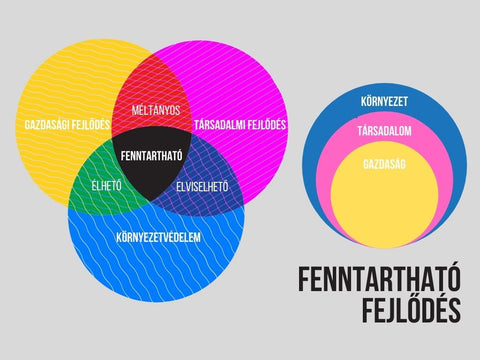By sustainability, many people mean the survival or preservation of something - wrongly. What does this word, increasingly bandied about since 1987, sustainability, actually mean? What did it mean for a long time, and what does it mean now? What has changed? What is the role of the environment now? What has the coronavirus epidemic proved? Which is more important: the economy, society or the natural environment? Are they equal? Is it sustainable? What can we do for sustainability? What can we do for development? What does sustainable development mean? Is development even achievable? How? Let's get started!
Sustainability in simple examples
If a logging village cuts down more trees than it regenerates, it is not environmentally sustainable. Sooner or later, all the trees in their environment will disappear. If a city has more people moving in and being born than moving out and dying, it is not socially sustainable. Sooner or later, overpopulation will make the situation untenable. If a family spends more per month than it earns, it is not economically sustainable. Sooner or later, it will go completely into debt and bankrupt. Constant growth leads to this: a dead end. But where do we go from here?
What can we do for sustainability?
Simple. What we extract from our environment cannot be more than what our environment can produce again. So if we cut down a thousand trees, we have to create the right conditions to regrow a thousand trees, or plant the same number of trees.
The reverse is no different. What we put back into our environment cannot be more than our environment can process.
The Earth's larder could run dry if we are not careful. We should reduce our so-called non-renewable resources - such as oil, coal, natural gas and uranium - so that they do not run out. We should increase the use of renewables to replace them. These include solar, wind, hydro, tidal, geothermal or Feedstock forCycle productsbiomass. But even renewable energy sources cannot be used in any quantity without consequences.

Quality, not quantity, matters
As we have seen, quantitative growth is not sustainable in the long term because it halves the future. So some other solution had to be found, as the Earth cannot grow, given its size. We have to make the best of it if we can't do any more. The best? But how? This approach replaced quantitative growth with qualitative growth.
Development instead of growth: fsustainable development
While growth is an increase in quantity, development is an improvement in quality. But this progress can only work through shared responsibility and concerted action. It must involve the economy, society and the environment. Like a three-legged chair, which can only be used if all three legs are stable. But how can they work together?

Which is more important? The economy, society or the environment?
The three pillars of sustainability are treated as equal: economy, society and environment. However, economic interests have the strongest influence. However, this does not seem to be sustainable.
What has the coronavirus outbreak proved?
The coronavirus epidemic also proved the primacy of the natural environment. If man had not robbed his environment, had not taken the habitat and lives of other species living with us, this virus would not have hit society and brought the economy to a standstill.
New direction: the environment first, which determines everything
According to a growing number of experts, the areas concerned are not on an equal footing. In contemporary thinking, the natural environment should determine the way society functions and the economy should adapt accordingly. In other words, environmental protection comes first.
So what is sustainable development - according to the UN?
The process of meeting the needs of the present without reducing the ability of future generations to meet their own needs. As the naturalist John James Audubon said, "The Earth is not inherited from our parents, but borrowed from our children."
Can sustainable development be achieved?
According to Mahatma Gandhi, "the resources of the world are sufficient to satisfy the needs of all, but they are not sufficient to satisfy the greed of all".
Do you agree with the new trend?
Do you agree that the natural environment should determine how society functions and the economy should adapt to it?




















